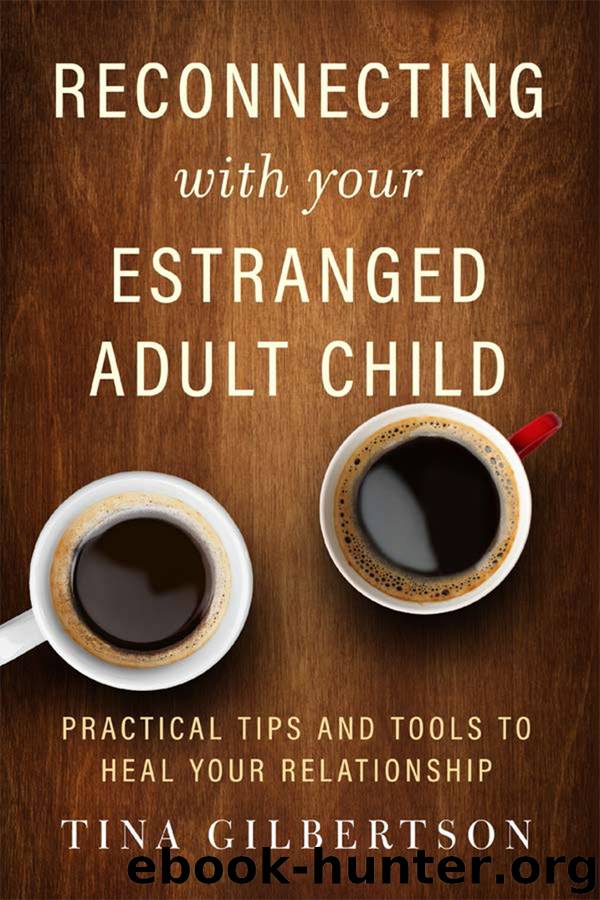Reconnecting with Your Estranged Adult Child by Tina Gilbertson

Author:Tina Gilbertson
Language: eng
Format: epub
ISBN: 9781608686599
Publisher: New World Library
Published: 2020-03-23T16:00:00+00:00
For more tips and a sample dialog, see chapter 10, “How to Choose a Therapist,” in my book Constructive Wallowing.1
Estrangement Specialists
People at a distance often ask me for referrals to estrangement specialists in their city, state, or country. The truth is, you don’t need a family estrangement specialist to get good therapeutic support.
Some fascinating research came out a few years ago about compassion for distress — that is, the ability of others to sympathize with what you’re going through.2 This is obviously a desirable quality in a counselor. The findings, however, turned common sense on its head.
Researchers found that, as a group, people who have successfully navigated a difficult situation actually have less compassion for folks who are having a hard time with exactly the same thing. This means that if you find a therapist or coach who used to be estranged from their own child and succeeded in repairing the relationship (arguably a proven expert), they might feel less compassion for you than someone who never had that problem in the first place.
If the findings reflect a general truth, I think this is wonderful news. Whether you’re talking to a therapist or another parent on the street, there’s really no need to despair if you can’t find someone who’s been estranged from their own child before. There’s a subtle but important point to understand about the research, which I’ll illustrate with the example of bullying.
The same study concluded that people who’ve experienced bullying are generally more compassionate toward those who are bullied than are people who were never bullied. Not surprising, right? They know what it’s like. They can relate. But that compassion plummets when the person being bullied fails to overcome the situation. If instead the victim acts out in distress, cries all day, gives up, or otherwise fails to overcome the bullying, their harshest critics are those who were bullied in the past and ended up in a good place. These happy former victims see the current victim as failing to endure the bullying.
The researchers hypothesized that previously bullied people either forget how hard it was to overcome the bullying and move on, or they place too much emphasis on the fact that they themselves endured (so of course it’s doable!), or both. This combination of knowledge and experience appears to result in lower compassion for the distress of current sufferers.
Extrapolating from this finding, the most compassionate supporters of parents with estranged adult children should be people who are currently experiencing estrangement themselves; they’re in the thick of it and can readily identify with your pain. The catch is, of course, that you’re talking to someone who doesn’t necessarily know how to solve the problem. They can empathize, but they can’t pull you out of the hole because they’re in it themselves. And if they get out first, they may lose patience with you if you remain stuck.
Although the conclusion is counterintuitive, all this research seems to indicate that if you’re having a hard time with your
Download
This site does not store any files on its server. We only index and link to content provided by other sites. Please contact the content providers to delete copyright contents if any and email us, we'll remove relevant links or contents immediately.
Should I Stay or Should I Go? by Ramani Durvasula(6795)
The Lost Art of Listening by Michael P. Nichols(6481)
The Rosie Project by Graeme Simsion(5198)
We Need to Talk by Celeste Headlee(4879)
Beartown by Fredrik Backman(4429)
Suicide Notes by Michael Thomas Ford(4275)
Hunger by Roxane Gay(4228)
Ego Is the Enemy by Ryan Holiday(3999)
I Love You But I Don't Trust You by Mira Kirshenbaum(3233)
Mummy Knew by Lisa James(3172)
Crazy Is My Superpower by A.J. Mendez Brooks(2864)
Girl, Wash Your Face by Rachel Hollis(2825)
The Complete Idiot's Guide to Coping With Difficult People by Arlene Uhl(2824)
Toxic Parents by Susan Forward(2811)
Not a Diet Book by James Smith(2739)
The Hard Questions by Susan Piver(2555)
Name Book, The: Over 10,000 Names--Their Meanings, Origins, and Spiritual Significance by Astoria Dorothy(2494)
The Gaslight Effect by Dr. Robin Stern(2355)
The Social Psychology of Inequality by Unknown(2312)
